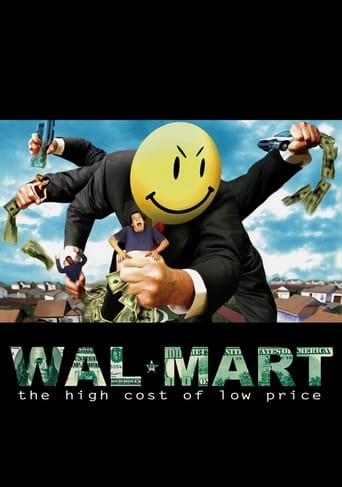

Very well executed
... View MoreAbsolutely Fantastic
... View MoreA waste of 90 minutes of my life
... View MoreAll that we are seeing on the screen is happening with real people, real action sequences in the background, forcing the eye to watch as if we were there.
... View More1. After 8 years of taking losses on the German market, Mal-Mart quit, closing its 90 stores in the country. Why? Not efficient enough compared to German supermarkets. Believe it or not, Mal-Mart's prices were higher and quality lower than in German supermarkets.2. Think of efficiency. If a store is more efficient than smaller stores and, thus, offers lower prices, the smaller stores should step down. Free market economy, right? Subsidizing smaller inefficient businesses by keeping Wal-Mart away is not the solution. Buy and read some books on basics of market economy. It's all about specialization. Whoever is not efficient at something, should do some other job.3. Americans are very proud of their special democracy, capitalism and freedom, but only in words. If the country belongs to you, why can't you change anything?! Corporations control the whole country without any serious regulations. Learn from some European countries. Or from Canada.3. Stop buying in Wal-Mart if you really care about your community. Is Wal-Mart forcing people to buy products in its stores? You like low prices, but don't like the consequences? Decision-making requires the sense of responsibility.4. If Wal-Mart employees don't like the company SO much, then why work there?! If you can't find any other work, then it's YOUR problem. Can't find any work in local community - look in other cities/places/states. Grow up. Think in advance of a proper education, professional skills and future.5. Watch the South Park episode on Wal-Mart.6. The scene in China is irrelevant, just because 99% of all companies in China work EXACTLY the same way.
... View MoreWal-Mart: The High Cost Of Low Price scores high for its strong message. In a classical political pamphlet Greenwald makes exposes facts about Wal-Mart that make your jaw drop, even though you don't have to agree with him.What bothered me extremely was it's horrible production value though. The soundtrack really stands out for its horrible quality. It is sometimes not anything better than experimental student television. As if they never watched the end product, pompous music is played bluntly over quotes as if they don't matter, and it seems they never took someone with them that had any knowledge of recording sound. Especially towards the end, I sometimes put my hands to my ears because of the wall of noise that was coming towards me.Bad editing is key. Cheap footage is abundant. The camera (wo)man was creative in its framing, but seemed to suffer from Parkinson's.Greenwald has wrapped a strong political message in a wet and wrinkled newspaper, instead of the great wrapping that it deserves.
... View MoreI don't and never have worked for Wal-Mart, but do enjoy the 20-30% savings per year by shopping there.If the unions of the U.S. didn't front the money for this "documentary", they should have. Show me any Company with 10% of Wal-Marts 2 million employees, I'll find you lots of disgruntled and dissatisfied ex-employees.When Wal-mart opens in a small town, or a populated area, other retailers are definitely hurt. Not just the Ma & Pa's, but Sears, K-Mart, successful grocery store chains, etc. It's not Wal-Marts fault! They're a business that has done business better than their competitors, big and small. It's why people shop there and make them the largest retailer in the world.When Wal-Mart stops doing it better than everyone else, their sales will drop, their stock will drop, they will lose money. When that day comes, Companies that take Wal-Marts business will grow quicker, have lot's of disgruntled employees, have many suits filed against them.This documentary is a slap in the face to the United States and what makes this country as great as we are. The United States is built on capitalism, we like to make money, we like to do things better than anyone else. Wal-Mart is a stock held publicly traded Company, with checks and balances, government regulation,etc. Watching this "documentary", you'd think Satin started and runs this Company.Obviously I'm in the great minority of posters on this "documentary", but someone had to say it.
... View MoreI'm somewhat bemused by comments by viewers like Mr Donald Fagan of Baltimore. The gist of his argument seems to be that Robert Greenwald is being unfair to Wal-Mart because other "big box" stores are playing the same game. The whole point of targeting the Wal-Mart chain is the sheer scale of their operation. If the senior management team at Wal-Mart achieve their ultimate goal, pretty soon there isn't going to be any K-Mart or Sears or ....whatever. One could just as easily argue that the Alex Gibney documentary "Enron: The Smartest Guys in the Room" was unfair to the top brass at Enron Corporation because other technology companies like "WorldCom" and "360 Networks" were run just as dishonestly! Nobody disputes that, but again you have to take the sheer scale of the operation into account. If only sleaze-bags like Michael Moore could produce documentaries as honestly and professionally as Robert Greenwald, the industry would be all the better for it in my opinion
... View More